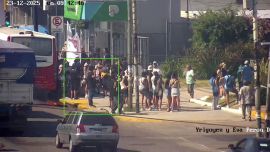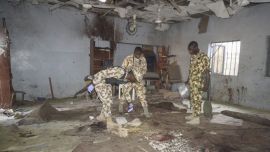Graciela Palacio de Lois joined the Familiares de Desaparecidos y Detenidos por Razones Políticas (“Relatives of the Disappeared and Detained for Political Reasons”) after the dictatorship’s death squads had kidnapped her husband, Ricardo Lois.
In the long search to find her partner, she k nocked on ma ny doors, pleading for help. Most gave no assistance. But Graciela, however, says she is particularly grateful to A llen “Tex” Harris, the US diplomat, who died this week aged 81.
“He prevented me from being kidnapped by the dictatorship,” she told the Times.
‘WITH TEX, IT WAS DIFFERENT’
Ricardo Lois was forcibly disappeared on November 7, 1976. He was taken to the ex-ESMA Nav y M e c h a n i c s School, a clandestine detention centre.
Ricardo and Graciela had married, got pregnant and had a young baby girl. They named her María Victoria. Both studied architecture and were members of the Peronist University Youth (JUP) organisation.
“Because of my militancy, I was prejudiced against going to the US Embassy [to ask for help], but with Tex Harris it was different. He was very open and cordial when I visited him,” remembers Graciela. “I used to go once a week or so. His secretary, Blanquita, let us enter without doing all the paperwork.”
One of Ricardo’s aunts lived in the United States. She had managed to get the US State Department to file a petition with the authorities, asking to know the young man’s whereabouts. That’s how Graciela first came to visit Washington’s Embassy in Buenos Aires and meet with Harris.
Graciela wouldn’t let up in her search. She sent several letters to the US authorities requesting their help, according to the declassified cables from the US State De - partment a few years ago.
“We were using t h e d iplom a t ic pouch to get information about what was happening in the country out to the United States,” she explains, referring to how Harris used diplomatic privileges to get information about crimes against humanity out into the wider world.
“For example, before the Inter-American Commission on Human Rights arrived in 1979, un compañero and I prepared a blueprint and information about Club Atlético [clandestine detention centre] and Harris managed to send it to Washington,” said Graciela.
Using her skills as an architecture student, Graciela drew up a blueprint of ‘Club Atlético.’ The site, which today lies underneath a motorway in Buenos Air e s , w a s o n e o f m o r e t h a n 7 0 0 torture camps that o p e r a t e d across the c o u n t r y between 1976 and 1983.
Located at the intersection of Paseo Colón and San Juan avenues, in the porteño barrio of San Telmo, it was torn down in order to build the motorway before the 1978 World Cup. Graciela’s plan is one of the many pieces of evidence that the dictatorship tried to destroy before the team from the IACHR arrived in the capital.
THE COMMUNITY PROTECTS
In one of her meetings with the US diplomatic official, Graciela asked Harris to meet with the relatives of the political prisoners who were being held in the country’s legal prisons. She could not at tend t he meet i ng but another member of Familiares offered to replace her.
The next time Graciela saw Harris, she would receiv e s h o c k i n g news. Tex asked her if she knew that there was a person in their group collaborating with the military, informing on them? The human rights group had been infiltrated, he explained, by the woman who had replaced her at the meeting. Dictator Jorge Rafael Videla had told the US ambassador in Argentina, Raúl Castro, that the Navy was after Graciela.
She couldn’t believe her ears, she recalls today. She had gone to see him with Lilia Jons de Orfanó, one of the founders of Familiares. The two women were puzzled. Lilia was in tears. Graciela had only one thought: getting someone to pick up her daughter and leaving the country.
“‘Stay calm,’ he said. ‘Nothing is going to happen to her. The community protects you,’” she recalls.
“He prevented me from being k idnapped by the dictatorship.”
The fate of Graciela’s husband is still unknown: he remains missing. When the military dictatorship eventually released its grip on power, she became one of the most active promoters of judicial investigations.
In the 1990s she filed an
injunction with the courts,
asking that the Carlos
Menem’s government be
blocked from demolishing
the ex-ESMA Navy Mechanics School and requesting
the creation of a national
park for reconciliation, on the site where the countr y’s
most in fa mous
clandestine detention centre
operated, where more than
4,000 people
lost their lives.related news

















Comments